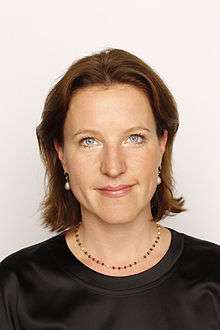Karolína Peake
| Karolína Peake | |
|---|---|
 | |
| Minister of Defence | |
|
In office 12 December 2012 – 20 December 2012 | |
| Prime Minister | Petr Nečas |
| Preceded by | Alexandr Vondra |
| Succeeded by | Petr Nečas |
| Deputy Prime Minister of the Czech Republic | |
|
In office 1 July 2011 – 10 July 2013 | |
| Prime Minister | Petr Nečas |
| Preceded by | Radek John |
| Personal details | |
| Born |
10 October 1975 Prague, Czechoslovakia |
| Political party | Independent |
| Other political affiliations |
Civic Democratic Party (1997–98) Public Affairs (2007–12) LIDEM (2012–present) |
| Spouse(s) | Charles Peake |
| Children | Two |
| Alma mater | Charles University |
| Profession | Lawyer |
Karolína Peake (born 10 October 1975), née Karolína Kvačková, is a Czech politician. She served as Deputy Prime Minister of the Czech Republic, and was the first woman to hold this position. She was elected to the Chamber of Deputies in the 2010 election, representing Public Affairs (VV), but left in April 2012 with seven other MPs.[1] The party she founded after breaking away from VV took the name "LIDEM", which means "for the people" in Czech, and is also based on the first letters of "Liberal Democrats".[2] She was appointed Minister of Defense in December 2012, but was dismissed by Prime Minister Petr Nečas eight days later, due to criticism of her rapid replacement of ministry deputies.
She was a member of Civic Democratic Party between 1997 and 1998, during her studies at university. In 1999 she graduated from the Faculty of Law at the Charles University and married Charles Peake, an Australian manager of Czech-Chinese origin. After this, she worked as trainee lawyer in the Czech branch of Baker & McKenzie. She gave birth to her sons Sebastian, and Theodor, with whom she took five years parental leave. Thereafter, she began to be involved in local politics, including campaigns to save a local park and to extend local children's playgrounds. In 2006, she was elected to the town council of Prague 1 as independent for Public Affairs
Peake is a member of Prague Society for International Cooperation, a respected NGO whose main goals are networking and the development of a new generation of responsible, well-informed leaders and thinkers.[3]
See also
Footnotes
- ↑ "Wobbled, not toppled". The Economist. 28 April 2012. Retrieved 1 May 2012.
- ↑ "Party around Czech deputy PM Peake to be called LIDEM - ČeskéNoviny.cz". Ceskenoviny.cz. 2011-05-18. Retrieved 2012-05-15.
- ↑ http://praguesociety.org/members

.jpg)